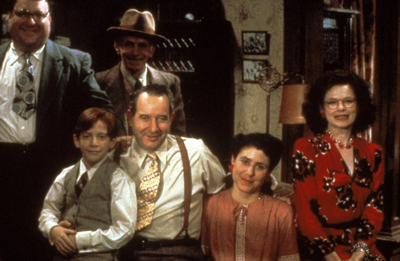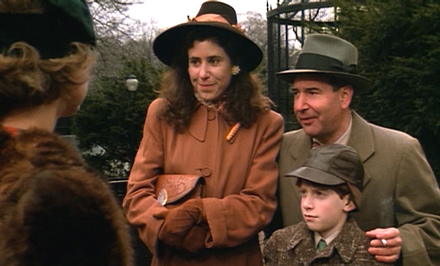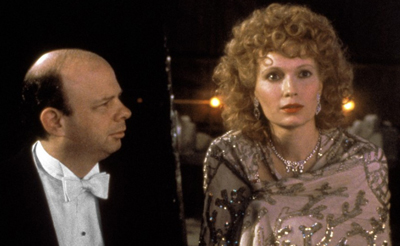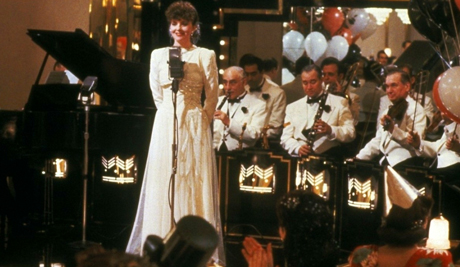
 |
|
|
|
I still think that Woody Allen found his most creative groove in the 1980s. We all remember the alien character in Allen's Stardust Memories that chides the director for abandoning the format of his earlier movies, "the funny ones". Yet Allen's next five or six light comedies show him fulfilling the promise made by Annie Hall: they're effortlessly funny, embrace affectionate characters and allow a sentimentality that balances his easy sarcasm. Right in the middle of this group of overachievers is 1987's Radio Days, a warm and happy show seemingly patterned after a film by one of Allen's favorite European art directors. Federico Fellini's heavily nostalgic Amarcord is a collection of loosely structured memory episodes. Italians live and grow up near the beach during the Fascist regime. We meet dozens of odd, amusing or glamorous people and observe family life at a sentimental distance. A group of boys ogle a strange madwoman / exhibitionist. Near the conclusion the entire community rows out to sea on a starry night, just to watch a glamorous cruise ship go by. The gleaming white ship passes, while the poor provincials dream about the god-like people that live in such luxury. 
Woody Allen's richly conceived movie all but surpasses its model. As the free-form, free-associative narrated reminiscence of a New Yorker named Joe (Woody Allen, of course), Radio Days communicates loving memories of his Jewish childhood in Brooklyn's forever windy Rockaway Beach, where working class folks live in large old houses with their extended families. In Allen's rosy remembrance, much of the glamour, mystery and beauty in their lives is provided by the New York radio programming. Every family member has his own favorite show. Allen makes it the movie's business to show how the music and fantasies emanating from the little tabletop boxes illuminate their lives. Radio Days has no story arc per se yet the mundane problems and eccentricities of little Joe's family hold us in a high state of amusement throughout. Joe's parents (Julie Kavner and Michael Tucker) argue incessantly, the way most people engage in conversation. Dad won't tell his son what he does for a living. Joe's Grandparents live in the same house, along with Uncle Abe (Josh Mostel), who brings home huge fish to eat. Cousin Ruthie (Joy Newman) passes the time listening to gossip on the party line. 1 Getting special consideration is Joe's Aunt Bea (Dianne Wiest), a spinster for whom hope springs eternal. 
When not arguing with their communist neighbors, Joe's family is glued to the radio. Sharing equal time with the home life scenes are visions of the glamorous radio personalities they worship. Joe loves a show called "The Masked Avenger", not knowing that its manly hero is voiced by a short and balding actor (Wallace Shawn). Mom & Dad greet the day by listening to an impossibly elitist, cultured couple whose breakfast ritual has been made into a morning show. Aunt Bea learns new dance steps from the songs, and Cousin Ruthie manages a dead-on imitation of Carmen Miranda. The show practically gushes Allen's love of the melodic songs period -- Glenn Miller, Cole Porter -- and the great performers that could be heard every night. A child star (Danielle Ferland of Into the Woods) sings a song about a birdie, and a familiar-looking personality (Kitty Carlisle) sings a radio jingle. Evening music shows all seem to be broadcast direct' from fancy nightclubs and ballrooms. Joe's family vicariously table-hops with the stars, while a Xavier Cugat-like Bandleader (Tito Puente) and his sexy singer perform the Latin music that inspires Aunt Bea to dance. 
Young Joe (Seth Green at age 13) is the filter for much of the nostalgia. He gets in trouble for stealing charity money to spend on a radio promotion. While looking for Nazi airplanes during the war years, Joe's the one of his gang that spots a naked woman in a window. He also sees a real Nazi sub cruising off Rockaway Beach. Joe is sometimes invited when his generous Aunt Bea has a date, which provides Woody Allen with the opportunity to a big movie night at the Radio City Music Hall. Picked out of a live radio audience, Bea wins a prize in a quiz show. Much of family history seems related to radio shows. One of Aunt Bea's dates is spoiled by Orson Welles' "War of the Worlds" broadcast, when her date panics and runs away into the fog. President Roosevelt's voice is heard frequently. And the family huddles together when a live news broadcast about a child trapped in a well proves to be too much for their emotions. The nostalgia factor is enhanced by the brief appearances of many of Allen's actor collaborators. Diane Keaton sings "You'd Be So Nice to Come Home To" in a beautiful white gown. Todd Field croons a young Frank Sinatra imitation. Jeff Daniels and Tony Roberts appear as a star personality and an emcee. The one extended story among the Manhattan elites is a hapless cigarette girl Sally White (Mia Farrow), whose singing aspirations are defeated by a squeaky voice. Her big opportunity in radio drama is squelched by news of the Pearl Harbor attack. 
With the help of his cameraman Carlo Di Palma and designer Santo Loquasto, Allen outdoes himself recreating the glamorous radio studios and nightclubs of the 1940s. Sally and a philandering big shot get stranded on the roof, where Loquasto's marvelous set places them amid giant animated neon signs of Times Square. When the entire cast of radio personalities runs to the roof during a gala New Year's Party, this forest of giant coffee cups and moving hands becomes Allen's equivalent of Federico Fellini's white cruise ship. The celebrities are living as if there's no tomorrow, while Joe's family back home gets to experience the glamour as an aural fantasy. With its unconventional narrative and forgiving attitude toward its characters, Radio Days stands out as one of Woody Allen's most imaginative and affectionate movies. The Twilight Time Blu-ray of Radio Days is spectacular in an HD transfer that brings out the glitter of the nightclubs as well as every detail in Joe's modest household. The colors are excellent, and the heightened contrast makes everything look more spectacular. 
Although Woody Allen mixed the film in mono, the dozens of rich music cues blend together beautifully. The disc carries an Isolated Music and Effects Track, which when played by itself will make excellent background music. An original trailer is included as well. Julie Kirgo's expressive liner notes go right to the heart of the film's appeal to our collective memories -- or in this case, the memories of our parents' generation.
On a scale of Excellent, Good, Fair, and Poor,
Radio Days Blu-ray rates:
Footnote:
1. Boy, the business with the party line now dates the movie. In 1987 all Allen had to do is mention the fact that Joe's family shares a party line with their neighbors. Younger people today have not only have never heard of party lines, they can't imagine how anyone could use one. Then they spill all their intimate information texting on cell phones.

Reviews on the Savant main site have additional credits information and are often updated and annotated with reader input and graphics. T'was Ever Thus.
Review Staff | About DVD Talk | Newsletter Subscribe | Join DVD Talk Forum |
| ||||||||||||||||||